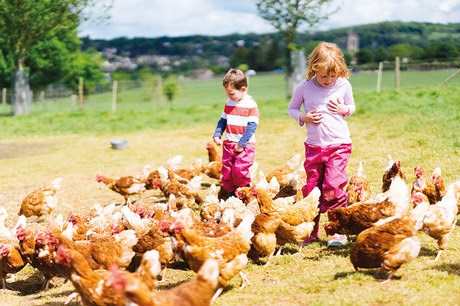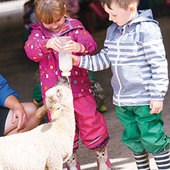A Unique Child: Nutrition - Get real!
Mary Llewellin
Monday, June 12, 2017
It is more important than ever to make children see where healthy food comes from, says Mary Llewellin

Unless you’ve silenced all media, you’ll know that the Conservatives’ election manifesto promises to save £650m by ditching free school lunches for infants and offering a much cheaper breakfast instead. Child health experts are disappointed, and celebrity chefs such as Jamie Oliver and Yottam Ottolenghi have taken to the airwaves to express their outrage. They see this as a short-sighted money-grab at the expense of children’s health and believe that taxpayers will ultimately face a far higher bill as obesity and Type 2 diabetes continue to take their toll.
You could argue – and the Conservatives plainly do – that giving free meals to all children, including those whose parents are able to pay, is a waste of money, but this is a short-sighted view that completely misses the point. When school meals are universally free, the uptake is far higher, making school kitchens more viable and removing the stigma for those receiving subsidised meals.
Sitting down to eat a shared meal with friends is a social occasion and a chance to learn about new and different foods; it encourages children to broaden the range of food they will eat. A balanced meal will support learning through better nutrition, but is also a learning experience in itself. There may be parents who are able to put together a nutritionally balanced and varied range of packed lunches, but there will be many who are too time-pressed or who lack the knowledge to do this successfully – and that includes many of the wealthier parents.
So, all this talk about schools, but what do the politicians say about nurseries? The Conservatives have pledged to roll out their 30-hour ‘free’ entitlement and the Labour Party has gone a step further, saying they would widen this to include all two-year-olds. If the funding rate does not rise to reflect the true cost of childcare and if nurseries are still unsure about whether they can charge extra for meals, then many will have to look at allowing packed lunches, making chefs unviable as take-up drops. Why aren’t people as outraged about this as they are about school lunches?
If all two- to four-year-olds receive 30 funded hours, they’ll be eating not just packed lunches but packed breakfast, snacks and tea as well. The knock-on effect will mean that even babies will be bringing food in for whole days at nurseries. And this during the most formative years of their lives in terms of shaping their tastes and developing their brains.
Let’s hope sanity prevails and the early years sector receives the support it needs and deserves to enable us all to continue improving children’s health outcomes.
FOOD FOR LIVING
In the meantime, we must support children’s healthy diets as comprehensively as we can. Apart from the food we provide, there are so many ways that we can widen their horizons, encourage curiosity and teach new skills to children to help them appreciate and value real food.
At Snapdragons, we approach this as broadly as we can, trying to involve everyone, including staff, in learning about the whole food cycle. In truth, we find that staff are often as much in need of an introduction to healthy eating as the children, and that underlines the vital importance of breaking the unhealthy eating cycle that has emerged in this country.
SOW THE SEEDS
So, the obvious start is to plant and grow food with the children. Even the smallest nursery can accommodate some pots of herbs, tomatoes, courgettes or strawberries; easy to grow, fun to water and delicious to eat straight from the plant. Helping children to sow the seeds and nurture the plant through its life until it develops juicy, colourful and, of course, edible fruits is a joy that never loses its appeal.
TASTING AND COOKING
The next step of taking something they have grown themselves and turning it into real, grown-up food is magical for children. The sense of importance they feel when they can use their home-grown vegetables to make all or part of a real meal is just lovely to see. At Snapdragons, we are constantly building on our recipe cards for cooking in the rooms because we are so concerned that cooking with children should not be limited to cupcakes and biscuits.
Chopping or grating fresh vegetables and tearing herbs to go into soups, casseroles, tarts or savoury muffins is easy, even for the smallest children, and helps to familiarise them with tastes, textures and processes that they may not encounter at home. We have had children at our nurseries who do not recognise a whole apple, only one that is sliced ready for snack, so the process of handling, cutting, smelling the whole fruit is a revelation.
DOWN ON THE FARM

Farm trips are another great way for children to encounter the truth about their food. We are very fortunate to be near a wonderful, working farm whose owners welcome children for a proper look at the realities of farming. We are regular visitors to Warleigh Lodge Farm, on the outskirts of Bath, where the children can bottle-feed lambs, collect eggs, throw sugar beet to the cattle and watch litters of piglets greedily guzzling milk from their mothers.
 This farm shows them the muddy reality of rearing animals and the seemingly conflicting sides of a farmer’s life: nurturing and caring for animals to make their life comfortable, but also accepting that they are bred for eating. Taking that a step further, trips to shops encourage conversation about fish, meat, cheese and where it comes from. Children are remarkably unperturbed by seeing legs of lamb in a butcher’s shop after feeding a lamb in a farm!
This farm shows them the muddy reality of rearing animals and the seemingly conflicting sides of a farmer’s life: nurturing and caring for animals to make their life comfortable, but also accepting that they are bred for eating. Taking that a step further, trips to shops encourage conversation about fish, meat, cheese and where it comes from. Children are remarkably unperturbed by seeing legs of lamb in a butcher’s shop after feeding a lamb in a farm!
ULTIMATELY…
We all have a vested interest in halting the disconnection between producing food and eating it. Only children who have the knowledge and skills to cook real food from scratch will be able to look after their own health as adults. We cannot go on allowing generations of children to grow up eating food from packets and not being able to recognise a whole apple.
We can only hope that whoever wins the election, common sense will make the Government invest wholeheartedly in early years even if they only see it as a way of saving the NHS from being overwhelmed by lifestyle diseases such as obesity, diabetes and heart conditions.
Mary Llewellin is operations manager at Snapdragons. Snapdragons Keynsham has the Food For Life Partnership Gold Catering Mark and was winner of the Nursery WorldNursery Food Award in 2012 and 2014.




